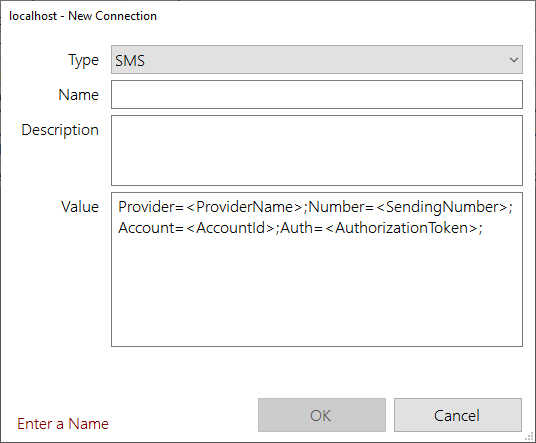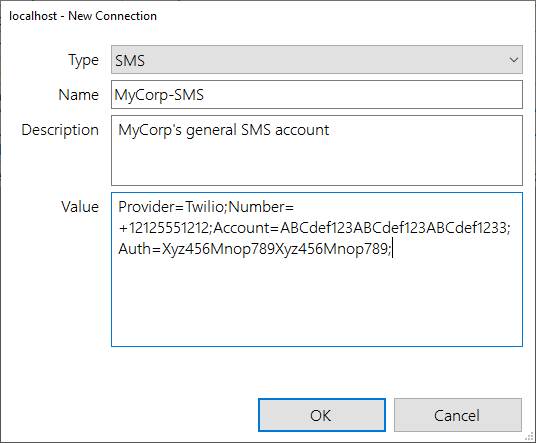[SMS] Send Message
Q100063: [SMS] Send Message
Send an SMS text message via the specified SMS service provider.
| Parameter | In/Out | Description | Other Info |
|---|---|---|---|
| SMS connection | In | Assign a defined SMS Connection or directly enter the parameters and values which make up a valid connection for SMS. |
Connection type: sysSMS |
| To | InOut | The phone number to send the message to, with multiple destinations separated by comma. The phone number should use the ITU E.164 format. Ex: +1 415 555 1212 | |
| Message | In | The body of the SMS message. | |
| Log output level | In | Choices: Minimal, VerboseThe level of execution detail you want to appear in the log. |
Default: Minimal |
| DateTime message was sent | Out | The DateTime the message was sent. |
(Italics = required parameters)
Notes
The [SMS] Send Message module can be used in a job to send an SMS Text Message to one or more devices. Note that the module has a dependency on using an SMS Messaging Provider to enable the communication. Currently the module only supports one provider, but this list of providers below will be updated with additional service providers in upcoming updates. Note that providers may have various pricing for their services, and you will need to consult their website or account representative to determine pricing and cost for your level of usage.
| Provider | Free Trial | Website |
|---|---|---|
| Twilio | Yes | Twilio SMS |
SMS Connections
The first step at using the [SMS] Send Message module is to create a valid SMS Connection for the provider you are going to use. The SMS Connection definition is centralized and can be used by any number of jobs. Multiple SMS Connections can be defined to specify alternative accounts, billing codes, etc. as you may need. To set up your connection, click on the Connections button on the main toolbar of the JobServer.NET Management Application. Click the New button, and then from the Edit Connection dialog, change the Type to SMS. You should see the value field will populate with a default template of parameters for the connection.

Before editing the value field, first provide a valid Name for your SMS Connection. This name is how it will appear in the modules connection parameters when used. Next provide a Description which can be used for a more detailed record of what this connection definition should be used for. And finally, we now want to edit the Value field and update the template of setting names and values for your provider account. The first setting in the template is Provider. To set yours correctly, remove the placeholder text <ProviderName> and use the name of the provider you have chosen from the table above. Note that exact spelling is critically important for all setting names and values. Next is the Number setting. This should be set to the phone number that the SMS message will be sent from. Your provider account may allow you to have multiple phone numbers to send from, but you must only select one valid From number for the setting. The next two are the Account and Auth settings. Update the value for each of these with the corresponding value shown for your account provider in the table below. You will find these values in your account provider website.
| Provider | Account | Auth |
|---|---|---|
| Twilio | AccountId | AuthorizationToken |
When complete, your settings for the SMS Connection should look similar to the example below. When you are finished filling out the values for all of the settings in the SMS Connection, hit the OK button to save the settings and continue.

Of course, the values shown in this example are not a real account and you must use the values from your own account.
Phone Numbers
When using the [SMS] Send Message module, all phone numbers should be in the standard ITU E.164 format. Thus a phone number should not be sent as 2125551212. It should be sent as +12125551212. While phone numbers not formatted properly may appear to work if they are local to the country your provider account is configured for, there is no guarantee of this for all providers or all circumstances.